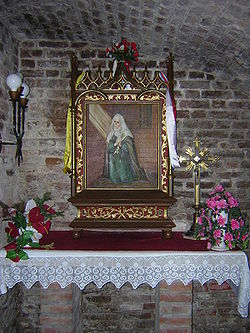- Dorothea of Montau
-
Saint Dorothea of Montau 
Cell of Dorothea of Montau in KwidzynBorn 6 February 1347
Groß Montau, Prussia (Mątowy Wielkie)Died 25 June 1394
KwidzynHonored in Roman Catholic Church Canonized 1976 Feast 25 June Patronage formerly Prussia
Monastic state of the Teutonic Knights
brides
widows
parents of large familiesSaint Dorothea (or Dorothy) of Montau (German: Dorothea von Montau; Polish: Dorota z Mątowów) (6 February 1347 – 25 June 1394) was a hermitess and visionary of 14th century Germany. After centuries of veneration in Central Europe, she was canonized in 1976.
Contents
Life
Dorothea was born at Groß Montau, Prussia (Mątowy Wielkie) to the West of Marienburg (Malbork) to a wealthy farmer from Holland, Willem Swarte (Schwartze). She was married at the age of 16 or 17 to the swordsmith Adalbrecht of Danzig (Gdańsk), an ill-tempered man in his 40s. Almost immediately after marrying she began to experience visions. Her husband had little patience with her spiritual experiences and abused her. Later, both made pilgrimages to Cologne, Aachen, and Einsiedeln. While Dorothea, with her husband's permission, was on pilgrimage to Rome, he died in 1389 or 1390. Of their nine children eight died, four in infancy, and four during the plague of 1383. The surviving daughter, Gertrud, joined the Benedictines.
In the summer of 1391 Dorothea moved to Marienwerder (Kwidzyn), and on 2 May 1393, with the permission of the chapter and of the Teutonic Order, established a hermit's cell against the wall of the cathedral. She never left that cell for the rest of her life.
Dorothea led a very austere life. Numerous visitors sought her advice and consolation, and she had visions and revelations. Her confessor, the deacon Johannes of Marienwerder, a learned theologian, wrote down her communications and composed a Latin biography in seven books, Septililium, besides a German life in four books, printed by Jakob Karweyse.
Dorothea died in Marienwerder in 1394.
Veneration
Dorothea was venerated popularly from the moment of her death as the guardian of the country of the Teutonic Knights and patron saint of Prussia. The formal process of canonisation, however, was broken off in 1404, and not resumed until 1955; she was finally canonized (cultus confirmed) in 1976.
Dorothea's feast day is celebrated on 25 June.[1] Her relics were lost, probably during the Protestant Reformation.
Literature
Her life, seen from the viewpoint of her embittered husband, is one of the subjects of the novel Der Butt (The Flounder) (1979) by Günter Grass.
See also
References
- ^ Martyrologium Romanum (Libreria Editrice Vaticana 2001 ISBN 88-209-7210-7)
 This article incorporates text from a publication now in the public domain: Herbermann, Charles, ed (1913). "St. Dorothea". Catholic Encyclopedia. Robert Appleton Company.
This article incorporates text from a publication now in the public domain: Herbermann, Charles, ed (1913). "St. Dorothea". Catholic Encyclopedia. Robert Appleton Company.- Stargardt, Ute (ed.), 1997. "The life of Dorothea von Montau, a fourteenth-century recluse" (original text by Johannes of Marienwerder, d. 1417). Lewiston: E. Mellen Press. ISBN 0-7734-8568-6
External links
- Saint of the Day at St. Patrick Catholic Church
- Heiligenlexikon article (German)
- Dorota z Mątowów (Polish)
Categories:- 1347 births
- 1394 deaths
- German Roman Catholic saints
- People from Prussia
- People from Kwidzyn
- People from the monastic state of the Teutonic Knights
- 14th-century Christian female saints
Wikimedia Foundation. 2010.
